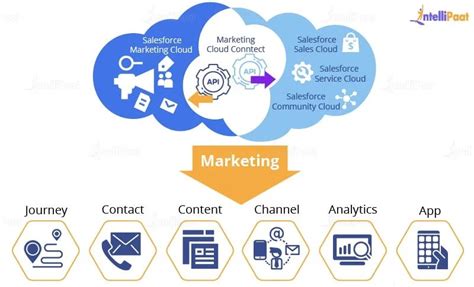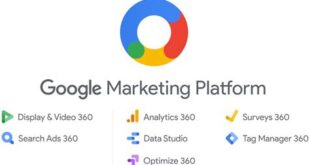
What is Marketing Cloud Intelligence?
Marketing Cloud Intelligence, also known as MCI, is a revolutionary technology that unlocks the power of data-driven insights to enhance businesses’ marketing campaigns and strategies. By harnessing the vast amount of data available in the cloud, MCI empowers marketers to make informed decisions, better understand their customers, and deliver more personalized and effective marketing initiatives.
Imagine having access to a comprehensive and intricate web of information about your target audience, their preferences, behaviors, and interactions with your brand. With MCI, all this valuable data is at your fingertips, enabling you to gain a deeper understanding of your customers and tailor your marketing efforts to meet their specific needs. This technology provides businesses with the intelligence they need to make informed decisions, drive strategic growth, and stay ahead of the competition in the fast-paced digital landscape.
One of the key advantages of Marketing Cloud Intelligence is its ability to analyze and interpret data from various sources, including social media, website traffic, email marketing, customer relationship management (CRM) systems, and more. By consolidating and analyzing this diverse range of data, MCI unveils meaningful insights that can significantly impact marketing activities, such as customer segmentation, targeting, and personalization.
In today’s digital age, customer expectations are continually evolving. They demand personalized experiences, relevant content, and seamless interactions across multiple channels. Here’s where Marketing Cloud Intelligence steps in. It equips marketers with the information they need to create highly targeted, personalized marketing campaigns that resonate with their audience and drive impactful results.
The power of Marketing Cloud Intelligence lies in its ability to identify trends, patterns, and correlations within the data. This technology employs advanced analytics and machine learning algorithms to detect hidden insights, allowing marketers to make data-driven decisions. With MCI, you can uncover which marketing channels are driving the highest conversion rates, identify the content formats that resonate most with your audience, and detect emerging trends or preferences that can shape your marketing strategies.
Furthermore, Marketing Cloud Intelligence facilitates seamless integration with other marketing tools and platforms. Whether it’s email marketing software, marketing automation tools, or customer analytics platforms, MCI can integrate with these systems to enhance their capabilities and provide a consolidated view of your marketing efforts. This integration enables marketers to streamline their workflows, synchronize data, and gain holistic visibility into their marketing performance.
In conclusion, Marketing Cloud Intelligence revolutionizes the way businesses approach marketing. By leveraging the power of data-driven insights, this technology enables marketers to optimize their campaigns, enhance customer experiences, and ultimately drive business growth. With its ability to decipher complex data sets, identify actionable trends, and personalize marketing efforts, MCI empowers businesses to create meaningful connections with their customers and stay at the forefront of the rapidly evolving digital landscape.
Find out how Google Marketing Platform can help you reach your target audience effectively.
The Benefits of Marketing Cloud Intelligence
Marketing Cloud Intelligence is a powerful tool that businesses can leverage to enhance their marketing strategies and drive better results. By utilizing this innovative technology, companies can gain valuable insights, improve customer targeting, personalize messages, measure campaign effectiveness, and ultimately increase their overall marketing effectiveness.
The introduction of Marketing Cloud Intelligence has revolutionized the way businesses approach marketing. This sophisticated platform harnesses the power of artificial intelligence and big data analytics to provide businesses with a deeper understanding of their customers. With access to this wealth of information, companies can make data-driven decisions and develop highly targeted and personalized marketing campaigns.
One of the key benefits of Marketing Cloud Intelligence is its ability to enhance customer targeting. By analyzing data from multiple sources, such as social media, website interactions, and purchase history, businesses can gain a comprehensive view of their customers’ preferences, behaviors, and demographics. This allows them to segment their audience and deliver highly relevant content to each individual, increasing the chances of engagement and conversion.
The personalization of messages is another advantage offered by Marketing Cloud Intelligence. With the ability to understand each customer’s unique preferences and interests, businesses can deliver highly tailored content across various channels. Whether it’s through email marketing, social media advertising, or website customization, personalized messages resonate more with customers, strengthening their relationship with the brand and increasing their loyalty.
In addition to improved targeting and personalization, Marketing Cloud Intelligence also enables businesses to measure the effectiveness of their marketing campaigns with greater precision. By tracking key performance indicators and analyzing campaign data, companies can gain valuable insights into which strategies are working and which need adjustments. This allows them to optimize their marketing efforts in real-time, ensuring maximum results and a higher return on investment.
Furthermore, by leveraging Marketing Cloud Intelligence, businesses can increase their overall marketing effectiveness. The ability to make data-driven decisions, personalize messages, and measure campaign performance ultimately leads to a more efficient and impactful marketing strategy. Companies can allocate their resources more effectively, focus on strategies that generate the most value, and ultimately achieve better results.
In conclusion, the benefits of Marketing Cloud Intelligence are vast and transformative. By utilizing this powerful tool, businesses can enhance customer targeting, personalize messages, measure campaign effectiveness, and increase their overall marketing effectiveness. With the ability to make data-driven decisions, companies can stay ahead of the competition and deliver highly relevant and impactful marketing campaigns that resonate with their audience. The era of traditional marketing is evolving, and those who embrace the power of Marketing Cloud Intelligence will undoubtedly reap the rewards of a more successful and efficient marketing strategy.
Key Features of Marketing Cloud Intelligence
Marketing Cloud Intelligence is a powerful tool that revolutionizes the way businesses approach their marketing strategies. By harnessing the power of advanced analytics, predictive modeling, customer segmentation, real-time data integration, and cross-channel marketing automation, this innovative solution empowers companies to make informed decisions, drive targeted campaigns, and optimize their marketing efforts for maximum impact.
So, what are the key features of Marketing Cloud Intelligence that make it such a game-changer in the world of marketing? Let’s dive deeper into each aspect:
Advanced Analytics
One of the standout features of Marketing Cloud Intelligence is its advanced analytics capabilities. With this tool, businesses can gain valuable insights into customer behavior, campaign performance, and overall marketing effectiveness. By analyzing data from various sources, including social media, email marketing, and website analytics, Marketing Cloud Intelligence provides a comprehensive view of your marketing efforts and helps identify trends, patterns, and opportunities.
Through advanced analytics, you can uncover hidden insights that go beyond surface-level metrics. It allows you to dig deeper into the data and understand what truly drives customer engagement, conversions, and loyalty. Armed with this knowledge, you can make data-driven decisions, optimize your marketing strategies, and allocate resources effectively.
Predictive Modeling
Another remarkable feature of Marketing Cloud Intelligence is its predictive modeling capabilities. Traditional marketing approaches often rely on historical data to make predictions about future outcomes. However, with predictive modeling, you can take your forecasting abilities to a whole new level.
By leveraging sophisticated algorithms, machine learning, and artificial intelligence, Marketing Cloud Intelligence predicts future customer behavior, campaign performance, and revenue potential. It considers various factors, such as demographics, past purchase history, online interactions, and external market trends, to generate accurate forecasts.
This valuable predictive insight enables you to anticipate customer needs, deliver personalized experiences, and tailor your marketing messages to resonate with your target audience. It helps you stay one step ahead of the competition, adapt to changing market dynamics, and optimize your marketing strategies for maximum effectiveness and ROI.
Customer Segmentation
Marketing Cloud Intelligence takes customer segmentation to the next level by utilizing sophisticated algorithms to divide your target audience into distinct groups based on their shared characteristics, preferences, and behaviors. This allows you to tailor your marketing efforts for each segment, delivering highly targeted and personalized experiences that resonate with individual customers.
By segmenting your audience effectively, you can ensure that your marketing messages reach the right people at the right time, through the right channels. This leads to higher engagement, increased conversions, and ultimately, improved customer satisfaction and loyalty.
Real-Time Data Integration
In today’s fast-paced digital landscape, real-time data is the lifeblood of effective marketing. Marketing Cloud Intelligence seamlessly integrates data from multiple sources in real-time, providing you with a complete and up-to-date view of your marketing efforts.
Real-time data integration enables you to react quickly to changing customer behaviors, market trends, and campaign performance. It allows you to make timely adjustments, optimize your strategies on the fly, and capitalize on emerging opportunities. With Marketing Cloud Intelligence, you are always equipped with the most accurate and relevant information to make informed decisions and drive impactful marketing campaigns.
Cross-Channel Marketing Automation
Marketing Cloud Intelligence streamlines your marketing efforts by automating cross-channel campaign execution. With this feature, you can create and manage personalized campaigns across various channels, including email, social media, mobile, and web.
The automation capabilities of Marketing Cloud Intelligence remove the need for manual intervention in repetitive tasks, such as campaign scheduling, audience segmentation, and content creation. This frees up valuable time and resources, allowing your marketing team to focus on high-value activities, such as strategy development and creative ideation.
Furthermore, cross-channel marketing automation ensures consistency and coherence in your brand messaging, regardless of the channel or touchpoint. It helps you deliver a seamless and integrated customer experience, fostering brand loyalty and driving business growth.
In conclusion, Marketing Cloud Intelligence offers a wide range of features that empower businesses to optimize their marketing strategies and drive meaningful results. From advanced analytics and predictive modeling to customer segmentation, real-time data integration, and cross-channel marketing automation, this innovative solution equips companies with the tools they need to stay ahead in today’s competitive market.
Stay updated with the latest trends and cloud market share statistics in the marketing industry.
Implementing Marketing Cloud Intelligence
Marketing Cloud Intelligence is a powerful tool that businesses can utilize to enhance their marketing strategies and drive better results. By implementing Marketing Cloud Intelligence, companies can gain valuable insights into their target audience, optimize their campaigns, and make data-driven decisions. In this article, we will explore the steps involved in implementing Marketing Cloud Intelligence and how it can benefit businesses.
Choosing the Right Technology Solution
When it comes to implementing Marketing Cloud Intelligence, choosing the right technology solution is crucial. There are numerous options available in the market, each with its own set of features and functionalities. It is essential for businesses to carefully evaluate their requirements and select a solution that aligns with their goals and budget.
Before making a decision, businesses should consider factors such as scalability, ease of use, integration capabilities, and customer support. It is advisable to opt for a solution that offers a user-friendly interface, robust analytics tools, and seamless integration with existing systems.
Integrating Data Sources
Integrating data sources is a critical step in implementing Marketing Cloud Intelligence. Businesses need to consolidate data from various sources, such as customer relationship management (CRM) systems, social media platforms, email marketing tools, and website analytics, to create a comprehensive view of their audience.
By integrating different data sources, businesses can gain a deeper understanding of customer behavior, preferences, and patterns. This enables them to create targeted campaigns, personalize messages, and deliver a seamless customer experience across multiple channels.
Defining Marketing Goals
Before launching marketing campaigns using Marketing Cloud Intelligence, it is essential to define clear and measurable goals. These goals should align with the overall business objectives and provide a roadmap for the marketing strategy.
Businesses should identify key performance indicators (KPIs) that are relevant to their marketing goals. Whether it is increasing website traffic, generating leads, or improving conversion rates, having specific goals allows businesses to track progress and make necessary adjustments.
Regularly Monitoring and Optimizing Campaigns
Once marketing campaigns are up and running, it is crucial to regularly monitor and optimize them. Marketing Cloud Intelligence provides real-time data and analytics, allowing businesses to track campaign performance, identify areas of improvement, and make data-driven decisions.
Businesses should analyze metrics such as click-through rates, conversion rates, customer engagement, and return on investment (ROI) to understand campaign effectiveness. By monitoring these metrics, businesses can identify what works and what doesn’t, and make necessary adjustments to optimize their campaigns for better results.
Furthermore, it is essential to stay up-to-date with the latest industry trends and marketing strategies. Marketing Cloud Intelligence evolves over time, and businesses should continuously learn and adapt to stay ahead of the competition.
Incorporating Marketing Cloud Intelligence for Success
Implementing Marketing Cloud Intelligence can have a significant impact on a business’s marketing efforts. By choosing the right technology solution, integrating data sources, defining marketing goals, and regularly monitoring and optimizing campaigns, businesses can leverage the power of data-driven insights to enhance their marketing strategies and drive better results.
With Marketing Cloud Intelligence, businesses can gain a deep understanding of their target audience, identify trends and patterns, personalize marketing messages, and deliver a seamless customer experience. By taking advantage of this valuable tool, businesses can stay ahead of the competition and achieve long-term success.
Explore the advantages of using digital marketing solutions to grow your online presence.
Challenges in Marketing Cloud Intelligence
Marketing Cloud Intelligence has emerged as a powerful tool for businesses to analyze and utilize data effectively in their marketing strategies. However, several challenges need to be addressed to fully harness the potential of this technology. In this article, we will explore the key challenges faced in implementing Marketing Cloud Intelligence and how businesses can overcome them.
Data privacy concerns are one of the primary challenges that organizations encounter when implementing Marketing Cloud Intelligence. With increasing regulations and growing scrutiny over data privacy, businesses need to ensure that they adhere to legal and ethical standards while collecting and analyzing customer data. Protecting personal information and maintaining customer trust is crucial in the digital age.
Data integration complexity is another hurdle faced by businesses utilizing Marketing Cloud Intelligence. With the vast amount of data generated from various sources such as social media, customer interactions, and website analytics, integrating and consolidating this data can be a daunting task. It requires advanced tools and technologies to collect, clean, and analyze data from multiple channels to gain valuable insights.
The need for skilled personnel is a significant challenge in effectively utilizing Marketing Cloud Intelligence. The technology itself may be powerful, but without individuals who understand how to interpret and leverage the insights gained from the data, its potential remains untapped. Organizations must invest in training their employees or hiring professionals who are well-versed in data analysis, marketing strategies, and the utilization of Marketing Cloud Intelligence tools.
Additionally, as Marketing Cloud Intelligence evolves rapidly, keeping up with the latest trends and advancements becomes crucial for businesses. Staying updated with new features, tools, and methodologies helps organizations gain a competitive edge. It is essential to continuously learn and adapt to changes in the field to maximize the benefits of Marketing Cloud Intelligence.
Moreover, cost is an inevitable challenge for businesses implementing Marketing Cloud Intelligence. The technology itself, along with the required infrastructure and skilled personnel, can incur significant expenses. Organizations must carefully evaluate the return on investment and consider the long-term benefits while deciding on the implementation of Marketing Cloud Intelligence.
Lastly, a lack of proper integration and collaboration between different departments within an organization can hinder the effective utilization of Marketing Cloud Intelligence. It is crucial for marketing, sales, and technology teams to work together cohesively to align strategies, share insights, and track performance seamlessly. Breaking down silos and fostering a collaborative environment can enhance the overall effectiveness of Marketing Cloud Intelligence implementation.
In conclusion, while Marketing Cloud Intelligence offers immense potential for businesses to advance their marketing strategies, there are several challenges that need to be addressed. Data privacy concerns, data integration complexity, the need for skilled personnel, staying updated with advancements, cost implications, and interdepartmental collaboration are all obstacles that organizations must overcome to leverage this technology effectively. By understanding and addressing these challenges, businesses can unlock the full potential of Marketing Cloud Intelligence and stay ahead in today’s competitive digital landscape.
Discover the features and benefits of Salesforce Marketing Cloud for your marketing strategies.
Successful Use Cases of Marketing Cloud Intelligence
Marketing Cloud Intelligence has proven to be a game-changer for numerous companies, revolutionizing their marketing strategies and driving remarkable results. By harnessing the power of advanced analytics, automation, and artificial intelligence, businesses have been able to greatly enhance their customer engagement, significantly improve conversion rates, and ultimately achieve a higher return on investment (ROI).
1. Empowering Personalized Marketing:
One of the key advantages of Marketing Cloud Intelligence is its ability to enable personalized marketing campaigns on a massive scale. With the wealth of customer data at their disposal, companies can create highly targeted and tailored messages that resonate with individual consumers. By understanding customers’ preferences, behaviors, and purchase histories, businesses can deliver relevant content at the right time, leading to increased customer satisfaction, brand loyalty, and ultimately higher conversion rates.
2. Enhancing Customer Journey Mapping:
Marketing Cloud Intelligence enables businesses to gain a comprehensive understanding of their customers’ journey across various touchpoints. By analyzing interactions and behaviors throughout the entire customer lifecycle, companies can identify pain points, optimize conversion paths, and deliver seamless experiences. This valuable insight allows businesses to make data-driven decisions, refine their marketing strategies, and maximize their overall conversion rates.
3. Streamlining Marketing Operations:
With Marketing Cloud Intelligence, companies can streamline their marketing operations and improve overall efficiency. Advanced automation tools enable businesses to automate repetitive tasks, such as email marketing, lead nurturing, and campaign management. By automating these processes, marketers can save time and resources, allowing them to focus on more strategic initiatives and improve their marketing productivity.
4. Predictive Analytics for Effective Campaigns:
Marketing Cloud Intelligence empowers businesses with predictive analytics, allowing them to anticipate customer behaviors and preferences. By utilizing predictive models, companies can identify patterns, predict outcomes, and make data-driven decisions. This predictive approach helps optimize marketing campaigns, allowing businesses to allocate their resources more effectively and drive higher conversion rates.
5. Improving Customer Retention:
Marketing Cloud Intelligence enables businesses to better understand their customers’ needs and preferences, leading to improved customer retention rates. By leveraging data analytics and segmentation techniques, companies can identify their most valuable customers and develop personalized strategies to retain them. By delivering tailored and relevant communications, businesses can foster stronger customer relationships, enhance loyalty, and ultimately reduce customer churn.
6. Driving Better ROI:
Marketing Cloud Intelligence plays a pivotal role in helping businesses achieve better marketing ROI. By leveraging advanced analytics and automation, companies can optimize their marketing budgets, ensuring that their investments are allocated to the most effective channels and campaigns. This data-driven approach enables businesses to maximize their marketing efforts, generate higher conversion rates, and ultimately achieve a greater return on their marketing investments.
7. Expanding Cross-Sell and Upsell Opportunities:
Marketing Cloud Intelligence presents companies with the opportunity to identify cross-selling and upselling opportunities within their customer base. By utilizing predictive analytics and segmentation strategies, businesses can identify customers who are most likely to be interested in additional products or upgrades. This knowledge allows companies to leverage targeted marketing campaigns to drive additional sales, boost average order values, and maximize revenue.
In conclusion, Marketing Cloud Intelligence has become an essential tool for businesses seeking to elevate their marketing strategies and drive unparalleled success. With its ability to enable personalization, optimize customer journeys, streamline operations, leverage predictive analytics, improve customer retention, drive better ROI, and expand cross-selling and upselling opportunities, Marketing Cloud Intelligence has proven to be a game-changer across industries. By embracing these successful use cases, companies can unlock new levels of marketing effectiveness and achieve remarkable results.
Learn more about marketing cloud and how it can benefit your business.
The Future of Marketing Cloud Intelligence
Marketing Cloud Intelligence is a powerful tool that allows businesses to harness the power of data and technology to drive their marketing strategies and achieve exceptional business growth. With its ability to collect, analyze, and interpret vast amounts of customer data, Marketing Cloud Intelligence provides valuable insights and enables businesses to create more targeted and personalized marketing campaigns. As the world becomes increasingly digital, the role of Marketing Cloud Intelligence is set to grow even more prominent.
1. Revolutionizing Customer Insights
In the age of big data, understanding your customers is crucial for any business. Marketing Cloud Intelligence allows companies to gain deep insights into customer behavior, preferences, and purchase patterns. By tracking and analyzing customer interactions across various digital channels, businesses can identify trends, detect patterns, and make data-driven decisions. This knowledge empowers businesses to deliver personalized experiences, tailor-made offers, and relevant content to their customers, driving engagement and increasing conversions.
2. Driving Data-Driven Decision Making
In today’s competitive landscape, decisions based on intuition alone are no longer enough. Marketing Cloud Intelligence provides businesses with reliable data and analytics to support decision making. By tracking key performance indicators (KPIs) such as customer acquisition costs, customer lifetime value, and campaign success metrics, businesses can make informed decisions and optimize their marketing efforts. This data-driven approach helps allocate resources more efficiently, identify areas for improvement, and refine marketing strategies for better results.
3. Enhancing Customer Journey Mapping
The customer journey has become more complex than ever, with customers interacting with businesses through multiple touchpoints. Marketing Cloud Intelligence enables businesses to map out the entire customer journey and understand the various touchpoints and interactions along the way. By analyzing data from different channels such as social media, email marketing, and website analytics, businesses can identify the most effective touchpoints and optimize their communication strategies to guide customers seamlessly through the purchase funnel.
4. Personalization at Scale
Personalization has become a key expectation for customers, and Marketing Cloud Intelligence enables businesses to deliver personalized experiences on a large scale. By leveraging data and segmentation tools, businesses can create highly targeted campaigns and messages that resonate with specific customer segments. This level of personalization not only enhances customer satisfaction but also increases conversion rates and customer loyalty.
5. Embracing Artificial Intelligence and Machine Learning
The future of Marketing Cloud Intelligence lies in the integration of artificial intelligence (AI) and machine learning (ML) technologies. These technologies enable businesses to automate complex processes, gain deeper insights from data, and deliver hyper-targeted marketing campaigns. AI-powered algorithms can analyze vast amounts of customer data, identify patterns, and make predictions, enabling businesses to optimize marketing strategies for maximum impact.
6. The Rise of Voice-Activated Marketing
The growing popularity of voice-activated assistants such as Siri, Alexa, and Google Assistant presents new opportunities for marketers. Marketing Cloud Intelligence can leverage voice data to understand customer preferences, behaviors, and intent. By analyzing voice interactions, businesses can create more personalized and contextually relevant marketing campaigns that cater to the unique needs and preferences of voice-enabled device users.
7. Addressing Privacy and Security Concerns
As data becomes more integral to marketing strategies, businesses must prioritize privacy and security. Marketing Cloud Intelligence solutions are continually enhancing data protection measures to ensure compliance with regulations such as the General Data Protection Regulation (GDPR). By implementing robust security measures and giving customers control over their data, businesses can build trust and maintain strong relationships with their customers.
8. The Democratization of Marketing Intelligence
Traditionally, access to sophisticated marketing intelligence tools was limited to large enterprises with substantial budgets and dedicated data teams. However, advancements in technology have made Marketing Cloud Intelligence more accessible to businesses of all sizes. Cloud-based solutions and user-friendly interfaces have made it easier than ever for businesses to collect, analyze, and leverage data for their marketing strategies. This democratization of Marketing Cloud Intelligence enables small and medium-sized businesses to compete with larger players and achieve remarkable results.
In conclusion, Marketing Cloud Intelligence is revolutionizing the way businesses approach marketing. With its ability to gather and analyze vast amounts of customer data, it empowers businesses to make data-driven decisions, enhance customer experiences, and drive business growth. As technology continues to evolve, Marketing Cloud Intelligence will play an increasingly influential role in shaping marketing strategies and helping businesses stay ahead in the digital landscape.
 Cloud Solution All Cloud Information
Cloud Solution All Cloud Information









